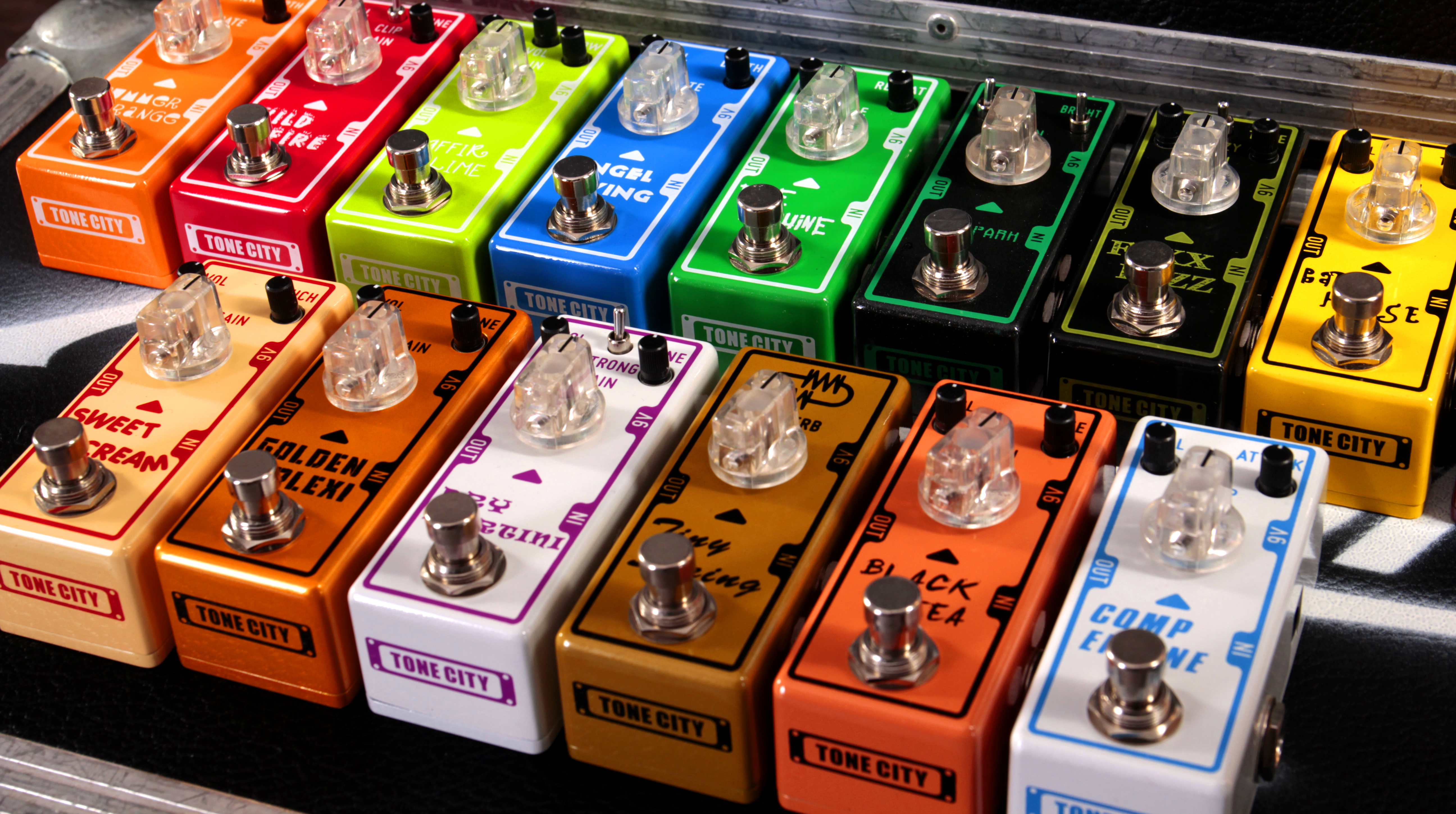What types of pedals do you need?
Every guitarist’s pedalboard is different, but there are a few core effects that form the backbone of most setups: overdrive/distortion, delay and reverb, and some form of modulation like a phaser/chorus. These cover the fundamental sounds you’ll want for a wide variety of guitar music. If you have a specific style in mind, other secondary pedals like a boost, a looper or a multi-effects unit might be your next picks.
Outside of effects, having a tuner pedal on your board isn’t strictly necessary, but we’d highly recommend picking one up for your setup. Let’s take a closer look…

Tuner pedals
What’s the point in having all the best effects if you’re out of tune?
While clip-on tuners are fine for getting started, a dedicated tuner pedal is well worth the investment. They’re generally more accurate, incredibly reliable, and won’t clutter up your guitar’s headstock. Plus, a tuner pedal will mute your signal when you engage it, making them much more suitable for live performance.
TC Electronic’s Polytune pedals have become something of an industry standard and offer excellent value. For an even more budget-friendly pick, a mini tuner like Landlord FX’s Lock In Tuner still performs well and conveniently takes up half the space. If you want the very best, you won’t go wrong with BOSS’ TU-3, although it’s on the more expensive side for a budget setup.
Tuner Pedals
Browse Tuner Pedals
Overdrive & distortion pedals
Everyone from the Beatles to Meshuggah use some form of overdrive or distortion. They really are essential in pretty much every pedalboard, even if you don’t play heavy music. Most overdrives or distortions follow one of five distinct styles: soft clipping Bluesbreaker, soft clipping Tubescreamer, hard clipping distortion RAT-style, hard clipping Klon Centaur and amp-in-a-box. Find more in-depth details on each in our ultimate overdrive pedal guide.
It’s common to have more than one OD/Distortion pedal on your board, and for you it might be worthwhile substituting out another effect to let you have that variety in a basic setup. For example, a low-to-medium gain crunch tone lets you play softer rock songs with some added saturation, while a high-gain distortion gives you the tone you need for heavier tracks. When plugged into a clean amp, you essentially have a versatile 3-tone rig meaning you can get a range of drive tones out of almost any amplifier.
Tone City makes some excellent budget overdrive pedals that genuinely compete with much more expensive options. They offer pedals covering all the main overdrive flavours, so you can find something that fits your sound without spending a fortune.
Overdrive and Distortion Pedals
Browse Overdrive and Distortion Pedals
Delay and reverb pedals
Time-based effects like delay and reverb are your go-to’s for adding depth and space to your sound. Delay can create everything from subtle slapback echoes to psychedelic rhythmic patterns, while reverb adds natural ambience that makes your guitar sound less dry and more resonant.
Digital delays tend to be cleaner and more precise, while analogue delays offer a distinct warmer tone with each repeat degrading over time which many players love. For reverb, you’ll find options ranging from simple spring reverb simulations to lush hall reverbs and everything in between.
You’ll probably want both eventually, and the good news is there are plenty of quality options under £100. TC Electronic and Mooer both make reliable, affordable delay and reverb pedals that sound great and won’t let you down.
Delay Pedals
Browse Delay Pedals
Reverb Pedals
Browse Reverb Pedals
Modulation pedals
Modulation covers a huge range of effects – chorus, vibrato, flanger, phaser, ring modulation, and more. These effects actively alter your guitar signal to create movement and texture in your sound.
If you’re just starting out with modulation, chorus is probably your best bet. It’s versatile, musical, and gives you a good taste of what modulation can do. A chorus pedal can be especially useful for home practice and solo jamming, letting you create a much fuller sound and adding depth to your single signal. The Electro Harmonix Clone Theory is a classic choice that adds beautiful depth and movement to your playing. If you’re looking to keep cost down here, brands like TC Electronic, Mooer and Ibanez offer some highly capable mini modulator and chorus pedals at very budget-friendly prices.
Chorus Pedals
Browse Chorus Pedals
Multi-FX and combination pedals
If you want to experiment with lots of different sounds quickly, multi-effects units can be a good option. They pack numerous effects into one box, often at a lower cost than buying individual pedals. Most also include effects loops, so you can still mix and match with other pedals.
Combination pedals that pair closely related effects (like reverb and delay, or chorus and vibrato) are another space-saving option. They typically cost more than single-effect pedals but less than buying two separate units.
If you want versatility in an affordable, space-saving unit, there are some great Multi-FX and combination pedals to pick up. Although if you know that you’ll regularly use a specific pedal type, it can be better to invest in a single-purpose pedal instead so that you don’t compromise on your most important effects.
Multi-FX Pedals
Browse Multi-FX Pedals




Responses & Questions